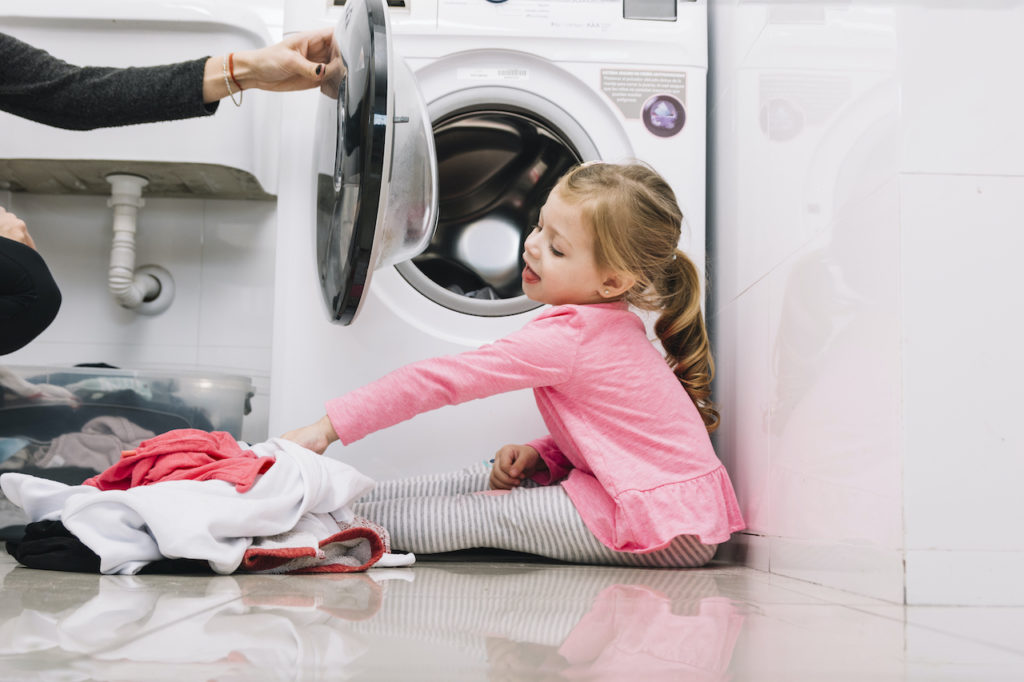
Yes, the struggle is real to get our kids to do their chores. “Go get your laundry done. This is the second time I am reminding you. If it is not done by 6pm today, you will not get your screen time.”
Sounds familiar? Yep, it happens in our household too. Despite me going on and on on how we need to get our kids started on chores and use it as a tool to subsequently teach them about money management, I also want to let you know that it is not a walk in the park.
Once they are past the natural intrinsic goodness stage, there are way too many things distracting and fighting for their time. The TV, the iPad, the books. Any of these naturally rank above doing chores in terms of enjoyment.
We adults have the same problems too. There are so many days when I wish I don’t have to cook another meal or clean up another pot. But yet, we do it, because we have to and we know we have to. And that’s the stage of maturity and responsibility that we are trying to level our kids up to.
And until they get to that level, there’s are a few strategies that we can have in place to make the progression easier.
1. Assign Age/Ability Appropriate Chores
The key here is to assign a chore that the kid can confidently do. If we assign a chore that is beyond their ability, they will get discouraged and frustrated and dread doing chores. Especially for younger kids, they thrive on celebratory encouragement, so shower them with lots of praises and encouragement. A 5 year old can help to unload the utensils from the dishwasher but it is probably too dangerous to expect them to also unload the heavy dishes. Here are some ideas of the various chores listed by age.
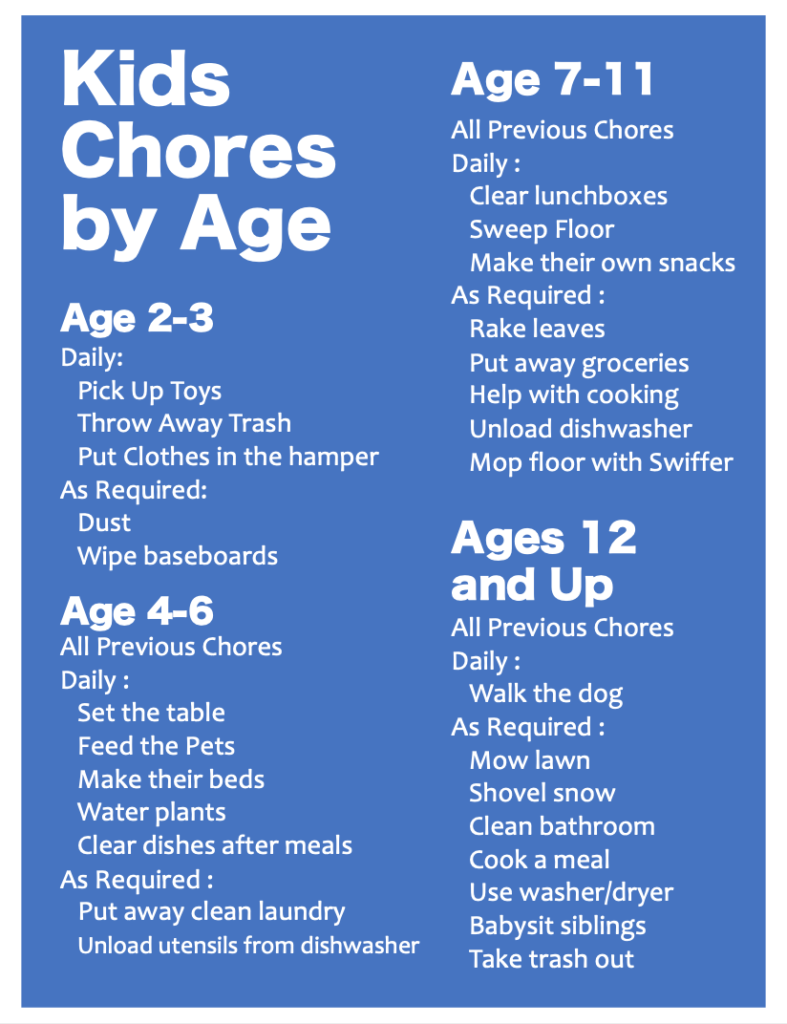
Although age is a pretty good rough indicator of what kind of chores a kid can do, it should not be a hard rule. One five year old could be very different from another five year old. As a parent, you would be the best assessor’s of your kids’ abilities. The good news is that, the younger you start them, the more confident they become at accomplishing tasks, and the more variety of chores they will be able to help out with over time.
2. Show them how to do the Chore
A chore may seem simple enough, but we all have our own quirks and expectations. So it is best, before we assign a chore to them, to state our expectations and how we want a chore to be done.
For example, one mom may prefer to have all her clothes hung up on hangers. Another may want their kids to use the Marie Kondo method to put away their clothes. This is the hardest. Resist the urge to want to just get things done. Resist the urge to get it done yourself or just give your child the broom and tell them go sweep the floor.
Slow down, take the time to show them that they need to pay attention under the tables, move the chairs around and sweep around the baseboards in order to get the job done. Also be prepared that you may have to repeat the instructional process a couple of times before they can do it well enough on their own.
If you remind yourself that they won’t get it perfect the first time, you will save yourself frustration and screaming fits down the road.
3. Provide Clear Instructions for doing the Chore
The first time we teach them the chores, we are likely to miss out some areas or was not clear enough in our instructions. For example, this was how my eight year old was hanging up her dad’s shirt.

Did she get the job done? Technically yes, because I told her to hang up all the shirts. But was it a job well done? Obviously no. I have made the mistake where my first reaction was to scream at her and accuse her of being sloppy. So please do not repeat my mistakes. I later realized it was partially an instructional failure and as the instructor, I need to be a better instructor.
So rather than get mad and make them feel like failures, we need to take a deep breathe and rethink how we can teach or set our expectations more clearly. So I took the shirt off the hanger, and told her that the clothes need to be hang up neatly, nicely and evenly and not just randomly thrown on.

I further explained to her that work is not about just getting it done. But to be done in a way that we can be proud of.
4. Provide Necessary or Better Tools for doing the Chore
We need to remind ourselves that they are kids. They may not have the dexterity or strength that we have. Where possible, we should try to provide tools that make the chore easier for them to complete.
In our home, we have a small broom and dustpan set, so the little ones can always easily clean up their own mess without having to pull out the vacuum cleaner. Similarly, if we want our toddlers to clean up their toys, then we need to make sure we provide them with the necessary bins and shelving so they know exactly where to return the toys to.

As for dad’s shirt, the regular plastic hangers were often too slippery to hold the shirts in place. So I invested in these non-slip hanger for the kids to use. It was a necessary investment to save headaches and frustration for everyone.
5. Provide the Right Environment for the Chore
What happens when you put three kids in a room without an adult? They play and monkey around. This is what I learned in our Laundry System 1.0. The three of them were supposed to put away the laundry together as a team, each putting away their own clothes.
But instead of the wonderful, assembly-line teamwork that I had in my mind, the kids were instead having dodgeball fights with their laundry! So mom had to rethink her system and finally came up with Laundry version 2.0 with three additional laundry basket.
One child is responsible for sorting out the clean laundry into separate baskets for the siblings. Each kid is then responsible for putting away their laundry by the end of the day. So by making sure I am not putting them in an environment for playing and messing around, there is less struggle to get them to complete the chore.
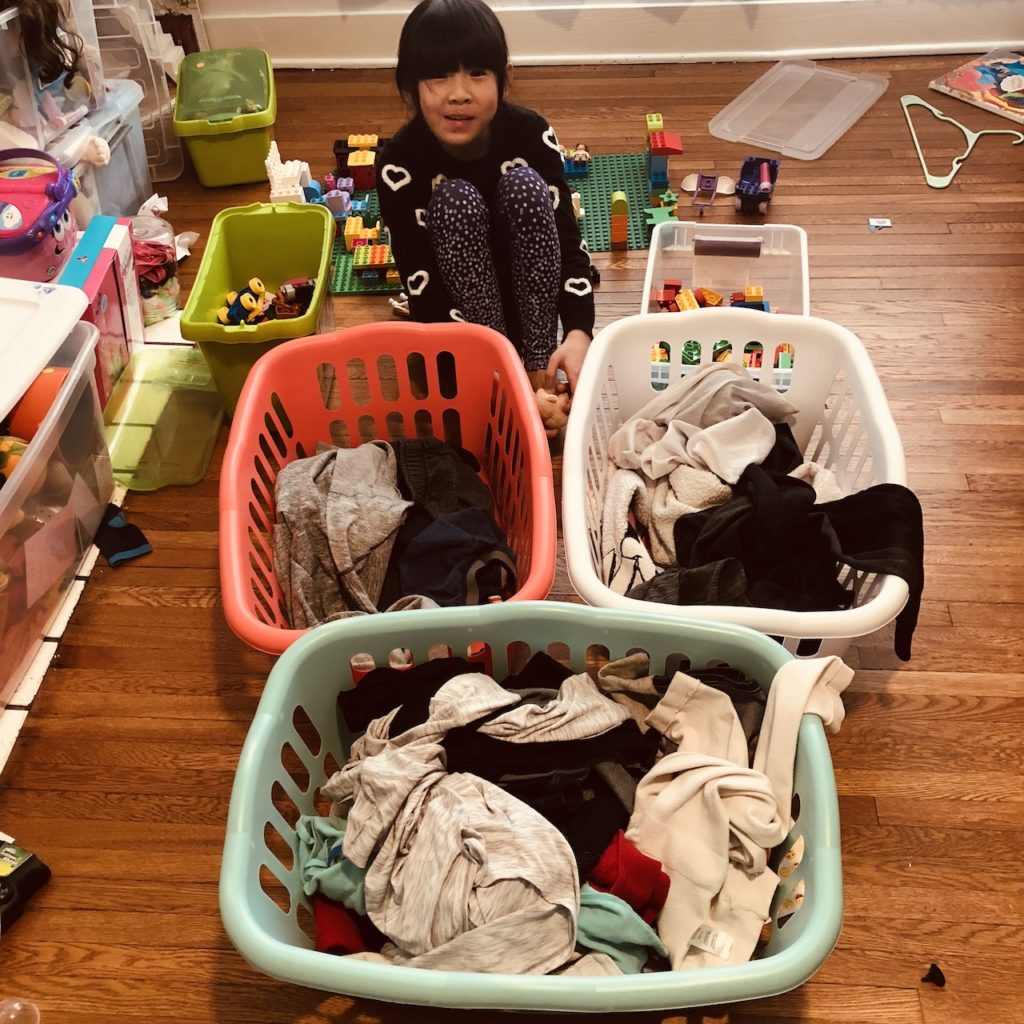
Setting aside time to do chores as family. Do you sometimes feels disgruntled when you are busy cooking and cleaning while the husband is on the couch watching football? We are all human, it is naturally to sometimes feel why do I also have to be the one doing ‘all’ the chores.
So we have chore time when everyone is cleaning up some part of the house together. This is usually done 20 minutes before bedtime, where we reset the house and clean up the after school mess and chaos. This is when school bags are packed and put away, lunch boxes are emptied and clean, any scrap of paper that they had strewn all over the floor is picked up and cleared away.
6. Have Regularity and Routine for the Chore
Where possible, try to have them do the same chore at the same time of the day or the same day of the week. This is where a chore chart or weekly planner will come in handy. Daily chores like making their bed, clearing their own plates after meals will evolve into habits like brushing teeth and over time will not require constant reminders for it to be done.
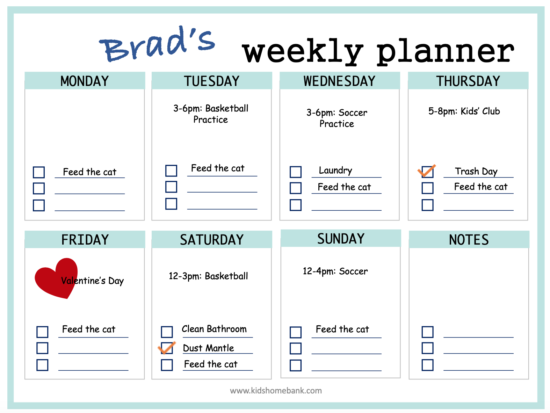
I like to combine their chores into a weekly planner. This way everyone is very clear how their time for the week will be used. The kids also learn to plan around their scheduled activities to get their chores done.
7. Natural Consequences when Chores are Not Completed
Last but not least, kids will be kids and as parents we have to parent them to understand that there will be consequences from irresponsible behaviors. Keep in mind that consequences are not mean to humiliate or embarrass your children or make them feel unloved. Rather, we need them to understand that we take them being responsible for their chores very seriously.
Remember we are trying to cultivate good work ethics and good character traits of responsibility and teamwork here.
Consequences can be divided in natural and logical consequences. They allow the child to experience the result, be it positive or negative, of his own behavior. For example, if the laundry is not completed, the natural consequence is that the child cannot find his soccer jersey for a very important soccer game and have to miss his game.
The child will be very upset and it is often very hard for moms to watch them being upset. Our natural tendency is to step in to help them find the jersey. But if we want to truly prepare our kids to be independent and responsible adults, we need stay firm and not ‘save the child’.
Instead, we need let them experience the pain of the natural consequence so that they will learn to not make the same mistakes again.
8. Loss of Privileges When Chores are not Completed
Loss of privileges is a form of logical consequence that are imposed by the parents. This should be communicated to the child ahead of time. They should not be imposed in the fit of anger at the moment when the chores are not completed. For example, in our family, the kids get their screen time only after their homework and chores are completed. This is a rule and they know well ahead of time what they need to do to earn their screen time.
9. Appropriate Rewards
Receiving rewards and positive feedbacks are some of the best motivation for the kids to get their chores done. However, we have to be careful to not build up an association that chores are done only because there is a reward at the end.
Hence, I would suggest to put some thoughts on how you choose to reward your kids once the chores are completed. In our family, there is no direct rewards for daily-living activities like putting the dishes away and putting dirty laundry in the laundry basket.
However, we choose to pay our kids for larger chore items like mowing the lawn and putting away clean laundry for their parents. It is part of our overall decision to teach them some financial principles of earning and saving while completing their chores. We pay them and track their savings using the KidsHomeBank app that we developed.
Additionally, not all rewards have to be monetary. For younger kids, appropriate rewards like sticker charts are awesome ways to build up their confidence as they become better at completing their chores.
Or even a simple reward of, you can get your cookies and snacks after you have cleaned up your toys is often enough to motivate the little ones
Conclusion
As you can see, sometimes it is really easier to just do the chores ourself. There is less parenting to do, less discipline to uphold and less frustration all around. But if we do that, we would have lost tremendous amount of opportunities to teach our kids to grow up to be capable, independent and responsible adults.


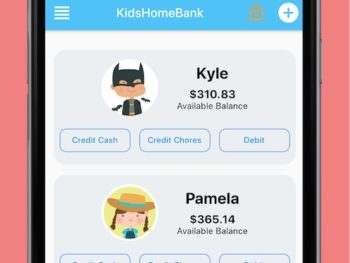

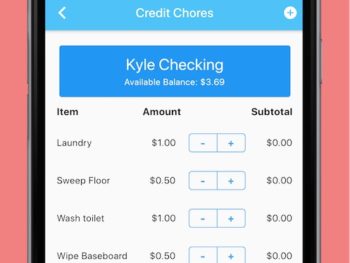

Great tips. Really working on this with our toddler. I love what you said about natural consequences because it’s something they can more easily comprehend. Loved this post. Great job!
Thank you! Yes, and it can be so hard to carry through sometimes. So many times I have to bite my tongue and hold back from reminding my kids to pack their soccer gear or swim gear.
I am hoping the natural consequence of missing out on the fun will help them to be more responsible.
Hi! This is na awsome way to explain the power and importance of teaching our kids to help out. I lile how you simplified the steps to help us actually tackle the task of getting them involved in doing age appropriate chores. Thanks for sharing!
You are welcome. I am glad it was useful 🙂
I struggle with routine and consequences. My son is a natural debater and he has a rebuttal for everything. But I do know that staying consistent with him would help. I love the graphic of age-appropriate chores. Great suggestions.
Oh yes, my kids too! I have decided to not get drawn into their arguments and instead sit down with them to draw up an agreed-upon chore schedule and chore list. This way everyone is clear on their responsibilities and hopefully there will be less excuses from them.
Great tips, especially choosing age appropriate chores! This is a tactic we’ve had great success using with our toddler 🙂
Yes, toddlers are great helpers!!